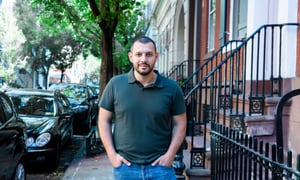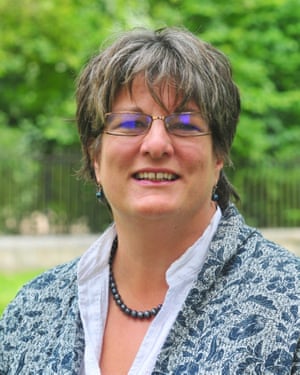
‘My depression was serious. I gained 60lbs. I felt suicidal’ ... conversion survivor Mathew Shurka in New York City’s West Village last month. Photograph: Tadej Znidarcic/Guardian
Mathew Shurka was 16 when he sat down with his father and told him he was gay. Brought up in a conservative New York suburb, the youngest child in a secular Jewish family and the only son, he was “terrified”. But, in that highly charged moment, the reaction was good. “He said: ‘I love you. I’m going to be on your side, no matter what,’” Shurka says. “He created security, which is what my father does ... He said: ‘Don’t worry, we’ll figure it out.’”
What he meant was he was going to try to “cure” him. Shurka’s father started talking to psychotherapists in New York. Within a week, he had found one who insisted there was no such thing as homosexuality, that everyone is born heterosexual and “same-sex attraction” is the result of childhood trauma or dysfunctional familial relationships.
“It was thought that, because I was still young, I had the highest chance of overcoming it,” Shurka says. “I was told how hard my life would be if I came out. I was told I could have the same attraction for girls as I did for boys. This was 2004. I’d never met an actual gay person. I was scared. I wanted to do whatever it took.” He adds that his father believed he was being supportive.
How was Shurka affected? “I knew that my feelings were not going away. I blamed myself; I wasn’t trying hard enough. My depression was serious. I gained 60lbs [27kg]. I felt suicidal all the time.”
Two films about conversion therapy will be released in the US this year, which is remarkable, considering most people probably think of it as a historical horror, from a time when homosexuality was criminalised and electric shock treatment was routinely offered as a cure. The Miseducation of Cameron Post, on which Shurka consulted, is an adaptation of a novel by Emily M Danforth about a lesbian (Chloë Grace Moretz) sent to a conversion camp. It is based on the real case of a 16-year-old who posted on Myspace about being sent somewhere similar. The Oscar-tipped, star-studded Boy Erased is adapted from a brilliant memoir by Garrard Conley, the son of a Baptist pastor who was enrolled on a Love In Action programme. Both stories unfold in the 21st century, which is when most of the survivors I speak to were subjected to conversion therapy. And is it not happening only in the US Bible belt.

Forrest Goodluck, Chloë Grace Moretz and Sasha Lane in The Miseducation of Cameron Post.
When Shurka was 19, he attended a weekend conversion camp called Journey Into Manhood, where Jack and the Beanstalk was the fairytale narrative of choice used to reclaim masculinity. “To get your seeds back from the giant in the clouds,” he says wryly. “They tried to make it fun with sports and activities.” One activity involved each of the 80 men sharing the trauma that supposedly made them gay. The others then had to re-enact it, but change the outcome to rewrite the individual’s history. Journey Into Manhood has run programmes in Poland, Israel and the UK. On the website’s timeline, it states that its “experiential weekend program for men conflicted over their same-sex attraction” was offered outside the US for the first time in 2007 – in England.
Conversion therapy – sometimes referred to as “cure” therapy, reparative therapy, ex-gay therapy or sexual-orientation change efforts – refers to any treatment aiming to change a person’s sexual orientation or suppress their gender identity. It is a nebulous term, encompassing what can be a range of highly damaging practices from an app offering a 60-day “gay cure”, available on iTunes and Google Play as recently as 2013, to spiritual interventions, talking therapies, drugs and, more rarely, extreme physical measures such as electric shock treatment, aversion techniques and “corrective rape”. All share in common the false, unethical assumption that being LGBT is a condition that requires curing. A psychological disorder, in other words.
“That we’re still having this battle 45 years after the APA [American Psychiatric Association] removed homosexuality from the diagnostic manual is incredibly disturbing,” says Carolyn Reyes, coordinator of the #BornPerfect campaign to end conversion therapy, which was launched in the US in 2014 by the National Center for Lesbian Rights. As she says, homosexuality was removed from the APA’s list of diagnoses in 1973 (although not completely excised from its Diagnostic and Statistical Manual of Mental Disorders until 1987), yet conversion therapy continues to be practised all over the world. Malta was the first country in Europe to ban it – only two years ago.
It remains legal in the UK, where a nationwide survey published in July as part of the government’s LGBT action plan found that 2% of the 108,000 LGBT respondents had undergone conversion therapy and 5% had been offered it. In 2015, the charity Stonewall found that one in 10 health and social care staff had witnessed colleagues express the belief that sexual orientation can be “cured”. A 2009 survey of more than 1,300 mental health professionals found that more than 200 had offered conversion therapy.

‘I became destroyed’ ... Bisi Alimi. Photograph: David M Benett/Getty Images
“The survey has shown the government what many people have known for a long time,” says the Labour MP Ben Bradshaw, who has raised the issue repeatedly in parliament this year. “This is more widespread than people realised. Announcing a ban is the easy bit. The difficult part is drafting the legislation and implementing it.”
In the US, anyone can give conversion therapy to an adult, but 13 states have passed bills stating a licensed professional cannot offer it to a minor. A report published in January by the sexual-orientation thinktank Williams Institute found that 698,000 LGBT adults in the US have received conversion therapyat some point in their lives, while an estimated 20,000 LGBT teenagers in the US will be subjected to it by a licensed healthcare professional before the age of 18.
Leandro Ramos is the director of programmes at All Out, an organisation that campaigns on LGBT rights around the world. He is in Brazil, where last year a ban on conversion therapy was overturned. He calls “so-called ‘gay cures’” a “global epidemic”. The impact can be nothing short of devastating. It is thought to increase suicidal thoughts by almost nine times. Depression, anxiety, substance abuse, loss of faith, high-risk sexual behaviours, guilt, isolation and self-hatred are all common effects.
“Conversion therapy teaches people that who they are cannot be healthy or right,” says James Guay, a survivor and a psychotherapist working with the LGBT community in West Hollywood. A lot of his work with clients involves “deprogramming from a cult-like experience”. He says recognising that there is nothing to repair can take a lifetime.
Yet, in the UK and elsewhere, conversion therapy has historically been underreported, underestimated or denied altogether. When one campaigner, whose partner killed himself after it was recommended he see a psychiatrist for a “cure”, got a meeting with the home secretary at the time, Amber Rudd, he claimed her response was to ask: “Why can’t we just tell people not to do it?”
Paul Twocock, the director of campaigns, strategy and research at Stonewall UK, says: “People [who have been undergone conversion therapy] don’t come forward to Stonewall very often. It’s a marginalised and underground activity.” The full extent of conversion therapy is unknown.
Bisi Alimi grew up in a mixed Christian-Muslim family in Lagos, Nigeria, and became a born-again Christian at the age of 15. “As soon as I thought I might be gay, I felt it was wrong,” he says. When two friends suggested he get help, he agreed to tell a pastor. “They were trying to help me, to be fair to them,” he says, beginning to cry. “They loved me.”
The conversion therapy lasted seven days, during which Alimi, then 17, was locked in a dark room and made to fast and pray around the clock. “I’m not allowed to eat anything or go out,” he says, slipping into the present tense. “I only have access to water and olive oil for anointing. The pastors are praying with me all night. I’m being constantly reminded of what happens to people like me in hell.”
Two weeks later, Alimi made his first suicide attempt. “I became destroyed,” he says. How did he manage to walk away? “I’m not sure I’ve ever walked away,” he says quietly. “I’m married now [to a man]. But I still have flashbacks.”

‘It’s the most vulnerable people who get hurt’ ... Jayne Ozanne. Photograph: Sam Atkins
Now a gay rights activist and UK citizen, Alimi says conversion therapy is “an epidemic” in some black, Asian and minority ethnic (BAME) communities. “We have to be bold enough to say it,” he says. “We’re talking about the lives of young people who are transported to their [or their family’s] country of origin to go through conversion therapy. These are British citizens being taken out of the UK to go to Nigeria, Ethiopia and Uganda. We can ban it here, but what laws will protect them?” What evidence does he have that this is happening to LGBT BAME people? “People come to me,” he replies. “Black Africans have told me they have been made to go through it here in London by pentecostal churches.”
For Jayne Ozanne, a leading gay activist in the Church of England – and the person who proposed the motion that condemned conversion therapy to the General Synod – a recognition that it is now almost exclusively carried out by faith groups is essential. Research she conducted last year found that 217 of the 553 LGBT people of faith who responded to her questionnaire had experienced conversion therapy. Almost half were under 17 at the time. “It has been part of the frustration for campaigners that people just didn’t believe us,” she says. “Some of us have been trying to convince the church, the government and even the LGBT community that this is a significant problem. It goes on in secret and it’s the most vulnerable people who get hurt.”
Ozanne is a survivor herself. Growing up in a conservative community in Guernsey, she joined a charismatic evangelical youth group called the God Squad in her teenage years. When she started falling for women in her 20s, she put herself through years of conversion therapy. “I spent thousands trying to make myself into something I should never have felt the need to change,” she tells me. “You don’t talk about this in the ‘real’ world. I’m an Oxbridge graduate. I was in a very senior position [in the Church of England]. You might think I should have known better, but the world I was in believed it with me.”
After suffering a second major physical and mental breakdown, Ozanne finally made the decision to embrace her sexuality when she turned 40. “It’s amazing what loves does,” she recalls of her first relationship with a woman. “The transformation was incredible. Many of my friends disowned me overnight and my family found it difficult, but the brave few who saw me couldn’t call it bad or evil.
“There are people right now being put through this,” she continues. “If you’re part of a community teaching it’s sinful to be gay, you will do anything to try to change. And it’s not just a Christian issue. It happens in the Muslim faith, Sikh faith … many black pentecostal communities will send their child back to Nigeria or Uganda, where ‘corrective rape’ therapy happens. I often compare it to FGM [female genital mutilation]: it happens in the back streets, performed by well-meaning people who cause deep harm. It takes a lifetime to recover.”

Théodore Pellerin and Lucas Hedges in Boy Erased.
Sally Hitchener is an Anglican priest and founder of Diverse Church, a community supporting 1,000 young LGBT Christians in the UK. “My experience of speaking to our members is that it has been prolific in the church in recent times,” she says. “In the 90s and 00s, every city in the UK would have a church doing it. People are sent to the US to go to 24-hour immersive camps,” she says. “One young person I worked with was told there was something cancerous inside him and promised it could be got out. I know people who were encouraged to take off all their clothes in large groups and [were] then shouted at.
“But the majority who have experienced conversion therapy in the UK go through it on a Sunday morning in their regular church service. People who are supposed to be encouraging faith are doing the opposite. Goodness knows how many future bishops, priests and nice old ladies we’ve lost because we didn’t allow them to be who they were.”
Shurka finally found the courage to leave conversion therapy. “I have a great relationship with my mother, father and sisters today,” he says. He is in “the most secure relationship of my life” with a man. His new religion is activism. How did he do it? “I never met anyone who changed,” he says. “In the end, I just walked away. That was six years ago,” he says. “I was in a lot of pain for a long time. It has been an incredible journey to discover there was nothing wrong with me all along.”
The Miseducation of Cameron Post is in cinemas in the UK on 7 September.
In the UK, Samaritans can be contacted on 116 123 or by emailingjo samaritans.org. In the US, the National Suicide Prevention Lifeline is 1-800-273-8255. In Australia, the crisis support service Lifeline is 13 11 14. Other international suicide helplines can be found at befrienders.org.
Chitra Ramaswamy
Click here to subscribe to our weekly newsletters in English and or French. You will receive one email every Monday containing links to all articles published in the last 7 days.
 Europe Solidaire Sans Frontières
Europe Solidaire Sans Frontières


 Twitter
Twitter Facebook
Facebook